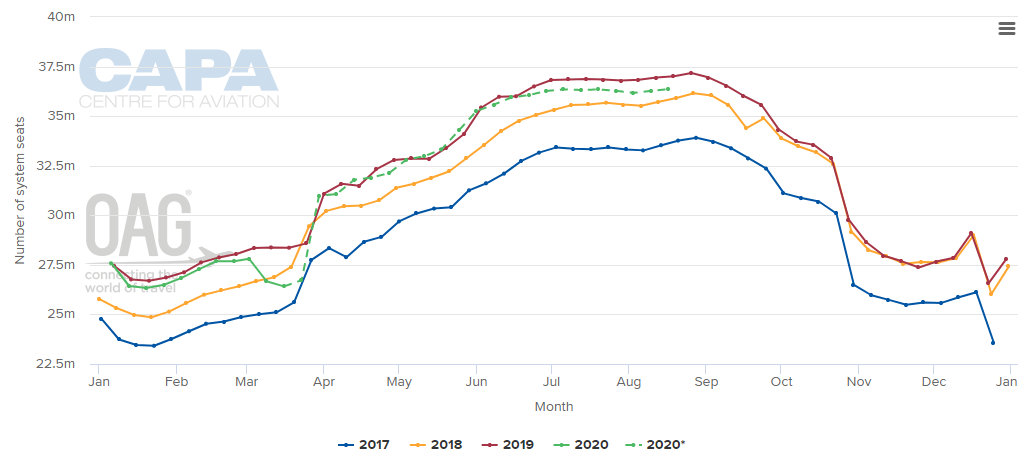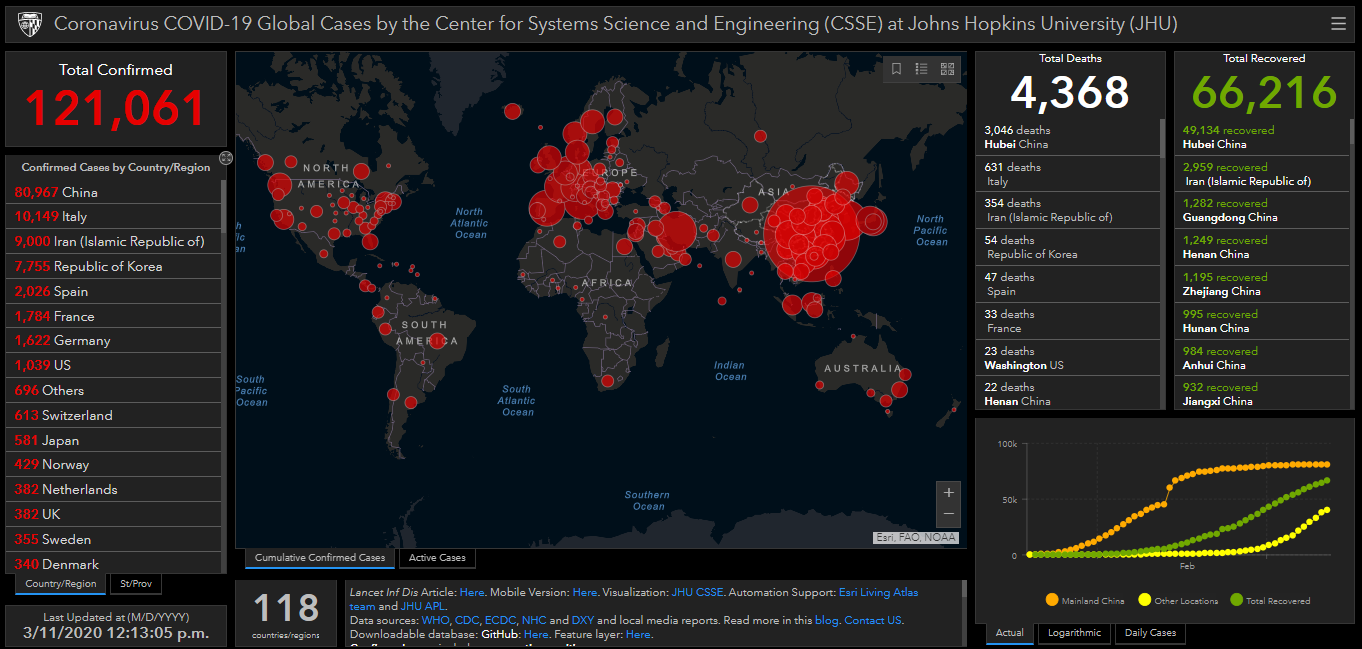In fact it is a lifetime. A lifetime of a virus that's initial outbreak is now seemingly almost under control across China. Having blocked citizens from leaving the country, Beijing is now enforcing a 14-day quarantine for people arriving into the city from countries deemed to be high-risk, currently including Italy, Iran, South Korea and Japan.
Global COVID-19 cases are now approaching 125,000 and the number of deaths will soon surpass 4,500. As we reported yesterday, Italy is now on lockdown and with the escalating European outbreak spreading, Spain, Germany and France could follow, with the United Kingdom, Netherlands, Switzerland Sweden and Norway not far behind with rapid rises in infections over recent days.
https://corporatetravelcommunity.com/italy-is-on-lockdown-other-parts-of-europe-will-follow-and-global-markets-are-in-crisis-it-is-hard-to-be-optimistic-but-there-are-actually-a-few-positives/
But are we now reaching a global stage where the fear of catching coronavirus could actually be worse than the virus itself? We are told that for most of us symptoms will be minor, we may not even know we have it. In fact many say that is true. But, for some it remains a killer, especially the old and infirm - it is these latter stories that has seemingly produced a level of hysteria that has influenced a slump in travel bookings.
While sales of anti-bacterial solution and toilet rolls may have gone through the roof, the travel sector is having to watch every penny. Air services are being cut - and not just into infected areas - aircraft are being grounded and that leads to job cuts. Similarly, global stock markets have recorded their worst performance since the 2008 global financial crisis as concerns over the economic impact of the Coronavirus outbreak intensified.
Airlines, in particular, are very efficient at restructuring in times of crisis. They have had lots of experience. The collapse of Flybe - while not directly an impact of coronavirus, even if it did perhaps deliver the killer blow - will not the only airline failure attributed to outbreak. It is the symptoms of falling demand and travel confidence that are to blame, but are they directly caused by COVID-19 or the hysteria surrounding it?
CHART - COVID-19 is starting to take hold in Europe and the impact on capacity has seen weekly system seats fall significantly for Mar-2020. The dotted green line will likely be revised downwards as more of Europe is exposed Source: CAPA - Centre for Aviation and OAG
Source: CAPA - Centre for Aviation and OAG
It is becoming evident everyday that the impact of COVID-19 is having a very serious impact to the global tourism, travel, transportation, hospitality industry apart from just to the health impact of the people that are affected by the coronavirus. It will have long lasting effects and will change the way people travel, meet, consume and engage in both business and leisure travel.
Many organisations have banned business and corporate travel to affected areas as part of their business continuity and staff welfare strategies. COVID-19 is a pretty virulent virus but it is not just our health, but also our mind that it is attacking. There is some justification to be wary as COVID-19 remains an unknown quantity and we don't yet have a vaccine, but are we simply sliding into a cycle of panic?
The real-time tracker developed by the Center for Systems Science and Engineering (CSSE) at Johns Hopkins University now lists over 120,000 cases across the world and over 4,300 deaths. It also highlights the over 66,000 infected that have recovered, an often overlooked figure when media report on the matter. Similarly, we forget the annual death toll of traditional seasonal flu, estimated at between 20,000 and 52,000 by the Centers for Disease Control and Prevention for the 01-Oct-2019 to 29-Feb-2020 period.

Professor Dimitrios Buhalis, a respected travel and tourism academic and established chair in tourism and deputy director of the International Centre for Tourism and Hospitality Research (ICTHR) at the school of services management at Bournemouth University, writes in his 'Brace, Brace, Brace and resilience: The global tourism, travel, transportation, hospitality industry should prepare for a major impact from Coronavirus COVID-19' paper, that the industry needs "to think smartly, strategically and sustainably to develop tools and methodologies for resilience".
It is becoming obvious everyday that there will be several months before we return to anywhere near what can be described as normality and it could take the best part of the year 2020 to recover the damages.
It is clear that this crisis will have major economic, political and socio-cultural impacts, while at the same time will change best operational practices and change global strategies. It is essential we cut through the hysteria, concentrate on the facts and collaborate to safeguard the future of an industry that binds us together.
KEEP UP WITH THE LATEST NEWS…

The impact on airlines of the recent COVID-19 coronavirus outbreak, which began in China but has spread around the world, continues to have a devastating effect on the aviation and supporting industries. In a new essential daily update, CAPA - Centre for Aviation is curating intelligence from the World Health Organisation (WHO) and myriad industry sources available via its CAPA Membership news and data service. Its mission is to help cut through the noise and provide a useful daily snapshot of the COVID-19 outbreak evolution, together with key industry developments.